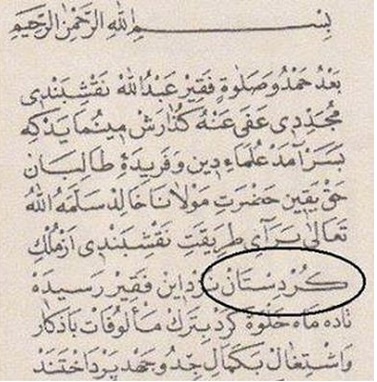Kurdshop_ Mowlana Khalid (1779_ 1826) was born in Qaradagh in Suleimani City. He was originally from the Goran Kurds. He began his education in Suleimani under the Sheikhs of Barzanji clan supervision who were followers of Qaderyeh traditions. He became an educator after his father died.
He went to Mecca for Haj and after he came back to Suleimani he dedicated himself to Sufism. In Suleimani he came to know a Sufi and then he went to Delhi at the recommendation of that Sufi. He began a new phase of his education in Delhi under Sheikh Abdullah Dehlawi’s supervision. After a while, Sheikh Abdullah made him the Calipha of Naqshbandi Tariqat (a particular doctrine in Sufism).
Upon his arrival, he began to help Naqshbandi Tariqat to spread to the cities and towns which resented the Qaderi Sufis of Suleimani. Due to this act, Mowlana Khalid and “Sheikh Marif Nodi’s” relationship ended. In order to prevent a severe situation, Mowlana Khalid moved to Baghdad and left Suleimani. He returned to Suleimani after two years but they did not let him stay for too long and he was forced to go back to Baghdad. This time they did not let him stay in Baghdad, either. He decided to move to Damascus. He stayed in Damascus for a while and he passed away in this city.
Mowlana Khalid had written several books on Aqidah, Sufism, and Fiqh. His letters and Divan were written in Persian. There are also several Kurdish and Arabic proses in his Divan. He had a Monajat Nameh in Kurdish, too. The first prose work in the Sorani dialect of Kurdish belongs to Mowlana Khalid.
Aqidah Namah
The Sufism works were written about the Sharia rules of Islam. Some distinct titles are being used for Aqidah Namah during the history of Islam.
Aqidah Namah in the Kurdish language:
Some of the Aqidah Namahs in Kurdish were written in poems and some of them were written in prose. We will take a look at some examples of Aqidah Namah written in different forms in Kurdish.
Aqidah of Iman (Beliefs on faith):
This Aqidah Namah was written by Ahmad Khani. This work was written in the Arabic alphabet but in the Kurmanji dialect of Kurdish. This book is considered to be the first Aqidah Namah in Kurmaji and it has been studied for over a century in Kurdistan schools.
Aqidatolmardiyah (Beliefs on men)
This Aqidah Namah was written by Mowlawi in the Gorani dialect.
Aqidah Iman_ Aqidah Islam (beliefs on faith_ beliefs on Islam)
This Aqidah Namah was written by “Mullah Mohammad Ali Houni” in Kurmanji/Zazaki dialect.
Aqidah Imam (beliefs on Imam)
This Aqidah Namah was written by Mowlana Sharazouri in Sorani prose and it is the oldest prose written in Sorani. We will discuss it in detail under the title of “Mowlana Khalid Aqidah Namah”.

Mowlana Khalid Aqidah Namah
This Aqidah Namah is also known as Aqida Imam or Lobbol’aqayed. It was written in 1819 in a simple and comprehensible language. It is also the oldest prose written in the Sorani dialect. However, since Mowlana Khalid was the son of Goran, there are words in the Gorani dialect in the text.
Mowlana Khalid had written most of his works in Arabic or Persian but this one was written in Kurdish. This shows that Mowlana Khalid wanted his book which is about Islamic beliefs in the Sunni religious branch to be read in Kurdish schools and libraries.
Mowlana Khalid wrote most of his works on Sufism in Arabic. However, he wrote his own beliefs in a simple language in Kurdish so that it would be studied by the Kurds more easily because at that time Kurdish schools were not very popular. The simple and comprehensible language of this work made it very popular in Kurdistan.
Mohammad Mullah Karim who was a researcher introduced this work in the Kori Zanyari magazine in 1981 as an independent topic. Kamal Rauof Mohammad studied the four versions of this book in 2004 and published the final version.
Mowlana Khalid’s Aqidah Namah was translated into Turkish by “Banouchi Mustafazadeh Khezr”. This was the first translation of Kurdish prose into Turkish.
Mowlana Khalid’s Aqidah Namah consists of two parts. In the first part, he talked about Islam’s conditions. He verified those conditions in detail for the readers. In the second part, he talked about Faith conditions. He clarified these conditions in detail, too.
Source:
YILDIZ Ayhan, the place of Books on Beliefs in Kurdish Literature and Education, Nowbahar Academy, No. 9; 2018.
Khalid Al-Baghdadi https://islamandsiklopedisi.org.tr/









